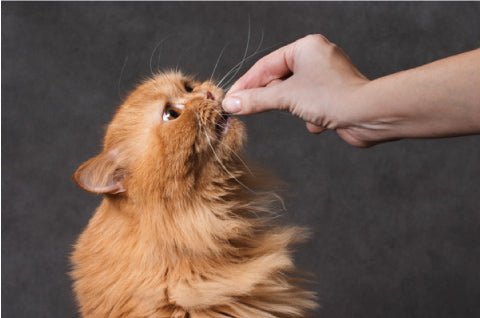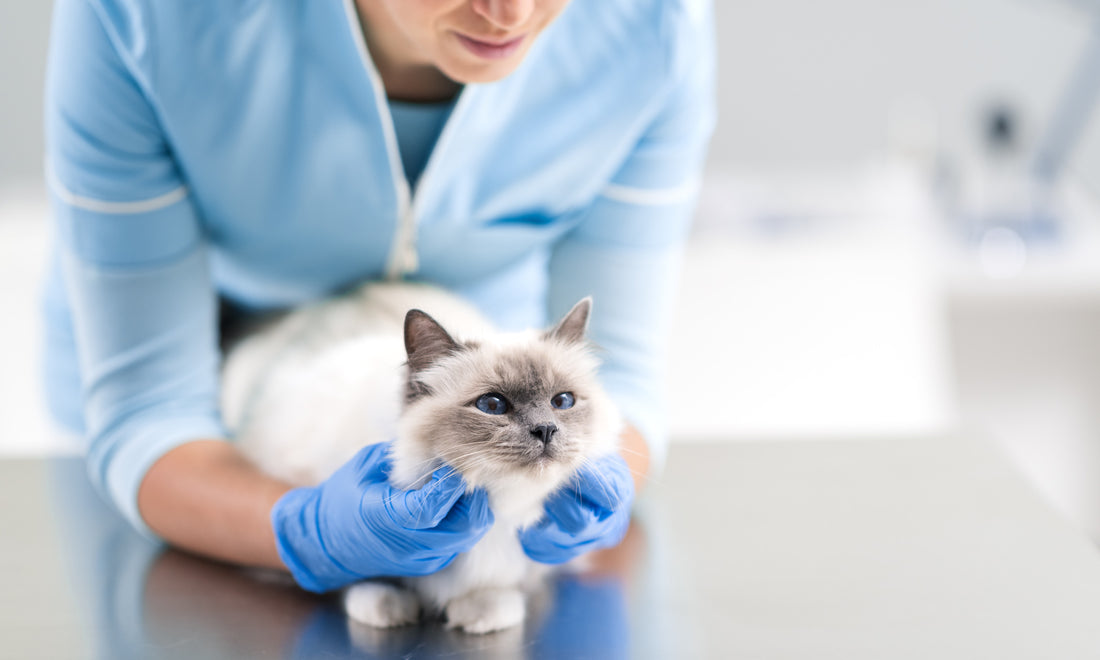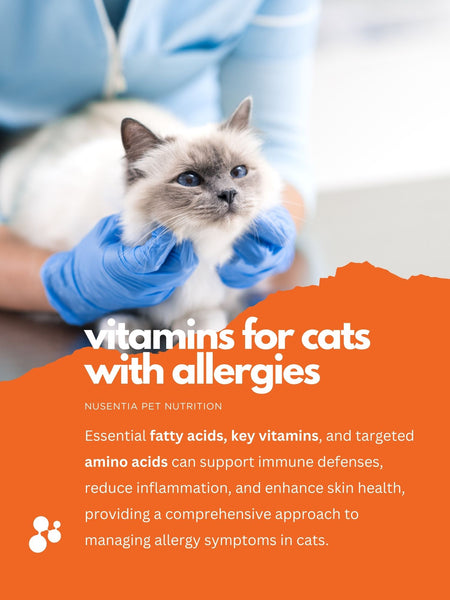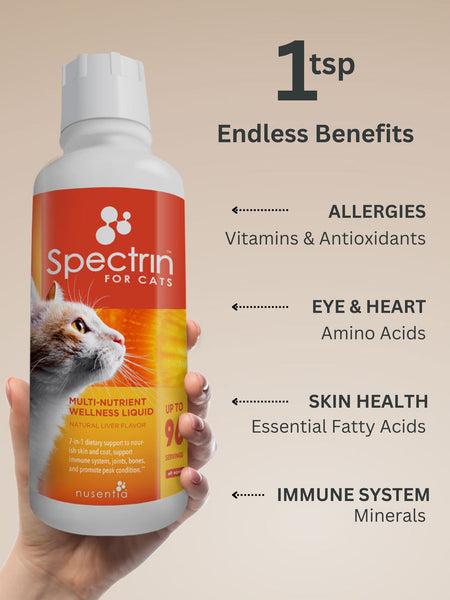Can I give my cat allergy medicine? Let's talk about feline allergies.If you’re reading this, we don’t need to explain to you that, just like us, cats have allergies. We know how hard it is to stand back while our kitties cough, itch, lick all the hair off their stomachs, and wheeze, so naturally, when that happens, you want an immediate fix!
What’s the quick fix for pain, inflammation, or allergies!? Let's discuss.
SUMMARY:
5 minute read
- Can I Give my Cat Allergy Medicine?
- Feline Nutrition vs Allergy Medicine
- Nutritional Changes for Cats
- Combat Feline Allergies with a Multivitamin Supplement
Can I Give My Cat Allergy Medicine
We’ve been asked about give cats cortizone for itching, aspirin or Tylenol for pain, and Zyrtec or Benedryl as allergy medicine for their allergies.
But are these good ideas?
Antihistamines, like Benedryl, are generally considered safe for cats, but make sure to consult with your vet to rule out any other causes of your cat's allergy symptoms first.
First of all, before you give your cat any kind of medication, seek your vet’s advice. Be sure to rule out any cause of the allergy symptoms which can first be handled without the use of medicines (for example: mites, or infections).

Further, understand that your cat’s metabolism is different than yours, and they simply can’t break down and use medications, like Benedryl, ibuprofen or acetaminophen, the same way that we do. Also, your cat licks his body, making human topical medications potentially toxic if ingested. So don't try to play vet on your own without professional advice. Your vet is likely to have an allergy medication or antihistamine for your cat with dosage tailored for your specific cat.
Lastly, if your vet prescribes something to help the acute situation of your cat’s allergies, there are bound of be a host of undesirable side effects that accompany its use. This is something you need to consider. Allergy medicines only treat the symptoms, and will do nothing to support the underlying issue causing your cat's discomfort. We believe it’s wise to seek a natural remedy to address the long-term defense against allergies.
Allergy medicines only treat the symptoms, and will do nothing to support the underlying issue causing your cat's discomfort.
Feline Nutrition vs Allergy Medicine
We know that natural remedies work for cats with allergies. Best of all, they don't come with negative side effects. We hear from our customers on a regular basis about how nutrition has made all the difference. In some cases it has totally decreased the need for allergy medications, in others it’s helped to reduce their use.
We know that nutritional support works for cats with allergies. Best of all, they don't come with negative side effects.
Vitamins and Antioxidants
When considering dietary supplements for cats, especially those prone to allergies, it's important to understand how various ingredients contribute to overall health and allergy management. Nutrients such as vitamins, minerals, amino acids, and essential fatty acids play pivotal roles in supporting immune function, enhancing skin health, and reducing inflammation. Here, we explore how specific supplements, including a range of vitamins and antioxidants, essential minerals, and other beneficial compounds, can help alleviate symptoms and improve the wellbeing of allergic cats
- Vitamin A (Palmitate): Vital for maintaining healthy skin and mucous membranes, which are the body's first line of defense against allergens.
- Vitamin B Complex (Thiamine, Riboflavin, Niacin, Pantothenic Acid, Pyridoxine, B12, Folic Acid): These B vitamins help support the immune system, energy levels, and overall metabolism, which can be taxed by allergic responses.
- Vitamin C (Sodium Ascorbate): An antioxidant that can help reduce inflammation and possibly mitigate some of the oxidative stress associated with allergic reactions.
- Vitamin D3 (Cholecalciferol): Supports the immune system and may help regulate immune responses, potentially reducing the severity of allergic reactions.
- Vitamin E (a-Alpha Tocopherol Acetate): An antioxidant that protects cell membranes from damage and can also help improve skin health, which is beneficial in cases of skin allergies.
Minerals
- Zinc (Gluconate): Essential for skin health and a well-functioning immune system, both of which are crucial for managing allergies.
- Selenium (Amino Acid Chelate): Works as an antioxidant, helping to manage oxidative stress and inflammation in allergic conditions.
- Iodine, Manganese, Copper, Boron: These trace elements support various biochemical processes including thyroid function, enzyme activities, and collagen synthesis, all of which are important for overall health and resilience against allergies.
Amino Acids and Related Compounds
- Taurine: Essential for cats, taurine supports eye health and cardiac function, as well as immune health.
- L-Arginine and L-Citrulline: Both support nitric oxide production, which can aid in immune responses and reduce inflammation.
- L-Methionine and L-Cysteine: These sulfur-containing amino acids can support detoxification processes and antioxidant defenses, possibly reducing allergic reactions.
Other Notable Ingredients
- Essential Fatty Acids (Lecithin from soy bean, Flax Seed Oil): Omega-3 and omega-6 fatty acids are known for their anti-inflammatory properties, which can help alleviate symptoms of allergies, such as skin irritation and itching.
- Glucosamine Sulfate: Typically used for joint health, its inclusion here may support overall mobility, which can be beneficial for cats experiencing discomfort from allergic reactions.
- Citrus Bioflavonoids: These have anti-inflammatory properties and can enhance the activity of vitamin C.
-
Betaine HCI: Helps with digestion and nutrient absorption, which is vital for maintaining an optimal immune response and overall health.
Nutritional Changes for Cats
Your cat is a strict carnivore and needs as close to a raw diet as possible. A processed diet is devoid of natural enzymes, vitamins, and beneficial bacteria that your cat needs to be healthy. In a matter of time, the stress of malnutrition and enzyme deficiency will show, and in many cases, it’s displayed with the symptoms of allergies.
We feel all cats thrive with a quality enzyme and probiotic supplement. It's not always realistic to feed our pets raw. Adding supplemental enzymes and probiotics is a great way to support the foundational immune system. Check out the Miracle Pack™.
Combat feline allergies with a multivitamin supplement
Try Spectrin™ for Cats, a Multinutrient wellness liquid for feline health
Multivitamins, like Spectrin™ for Cats, provides essential vitamins, antioxidants and nutrients that have been shown to be very helpful for combatting feline allergies:
“My cat has been taking Spectrin vitamins for about a week now and already I see an improvement. He licks himself till he's balding and these vitamins are really helping. I already see his fur growing back.“
The best part of treating your cat nutritionally, rather than with medications, is that there are no unpleasant side effects. Spectrin™ contains specialized amino acids, minerals, and bioflavonoids that help treat the root problem that plagues most cats with allergies.
“My cats are more energetic when taking Spectrin vitamins. But the biggest change was in my compulsive licker, who has licked all the hair off her stomach and back legs, part of her tail and butt. After a few weeks of taking this, the hair grew back.“
So while allergy medicine for cats may be helpful in the short term, wouldn’t it be better to resolve our cats’ ailments through natural nutrition?
The Allergy Pack
Discount bundle of our top 3 nutritional support products for immune compromised cats.
Visit Nusentia for natural, trusted pet health supplements with proven formulas to improve your furry friend's overall health. A trusted brand by veterinarians and pet parents since 2008.






